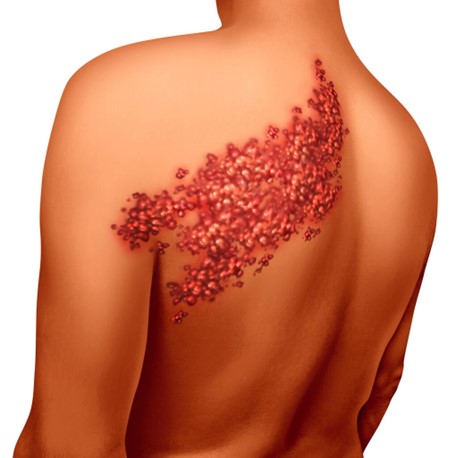A nurse is collecting data about immunizations from a 65-year-old client who has no identified risk factors for disease. The nurse should identify the client's need for which of the following immunizations?
Inactivated polio virus
Herpes zoster
Human papilloma virus
Measles, mumps, and rubella
The Correct Answer is B

The correct answer is choice B, herpes zoster. A 65-year-old client should receive the herpes zoster vaccine, which is recommended for adults over the age of 60 years to prevent shingles. Choice A is incorrect because inactivated polio virus vaccine is recommended for travelers to areas where polio is endemic or epidemic, and for laboratory workers who handle specimens containing poliovirus. Choice C is incorrect because the human papillomavirus vaccine is recommended for females aged 9-26 years and males aged 9-21 years. Choice D is incorrect because the measles, mumps, and rubella vaccine is recommended for individuals born after 1957 who have not had the vaccine or the diseases.
Choice A: Inactivated polio virus vaccine is incorrect because it is recommended for travelers to areas where polio is endemic or epidemic, and for laboratory workers who handle specimens containing poliovirus.
Choice C: Human papillomavirus vaccine is incorrect because it is recommended for females aged 9-26 years and males aged 9-21 years.
Choice D: Measles, mumps, and rubella vaccine is incorrect because it is recommended for individuals born after 1957 who have not had the vaccine or the diseases.
Nursing Test Bank
Naxlex Comprehensive Predictor Exams
Related Questions
Correct Answer is A
Explanation
The correct answer is choice A. The nurse should instruct the client to take iron supplements between meals for maximum absorption. Choice B is incorrect because antacids can decrease the absorption of iron. Choice C is incorrect because orange-colored stools may occur after the first dose of iron. Choice D is incorrect because milk can also decrease the absorption of iron. Choice B is not correct because antacids can decrease the absorption of iron. Choice C is not correct because orange-colored stools may occur after the first dose of iron. Choice D is not correct because milk can also decrease the absorption of iron.
Correct Answer is D
Explanation
The correct answer is: D.
Choice A reason: Asking a patient to rate their pain on a scale from 0 to 10 is a common method to assess the intensity of pain, not the quality. Zero indicates no pain, and ten represents the most severe pain imaginable. This scale is quantitative and helps in tracking the effectiveness of pain management over time.
Choice B reason: Inquiring if the pain is the same as it has been is a question that assesses the consistency or changes in the patient’s pain over time. It does not provide information about the quality of the pain but rather its course or any variations in the experience of pain.
Choice C reason: Asking whether the patient has any pain this morning is a question that determines the presence or absence of pain at a particular time. It does not elicit details about the nature or characteristics of the pain, which are essential to understanding its quality.
Choice D reason: Asking “What does your pain feel like?” is a qualitative question that aims to describe the characteristics of the pain, such as aching, stabbing, or burning. This information is crucial for diagnosing the cause of pain and tailoring appropriate treatment strategies. It directly addresses the quality of the pain, which is the focus of the nurse’s inquiry.

Whether you are a student looking to ace your exams or a practicing nurse seeking to enhance your expertise , our nursing education contents will empower you with the confidence and competence to make a difference in the lives of patients and become a respected leader in the healthcare field.
Visit Naxlex, invest in your future and unlock endless possibilities with our unparalleled nursing education contents today
Report Wrong Answer on the Current Question
Do you disagree with the answer? If yes, what is your expected answer? Explain.
Kindly be descriptive with the issue you are facing.
